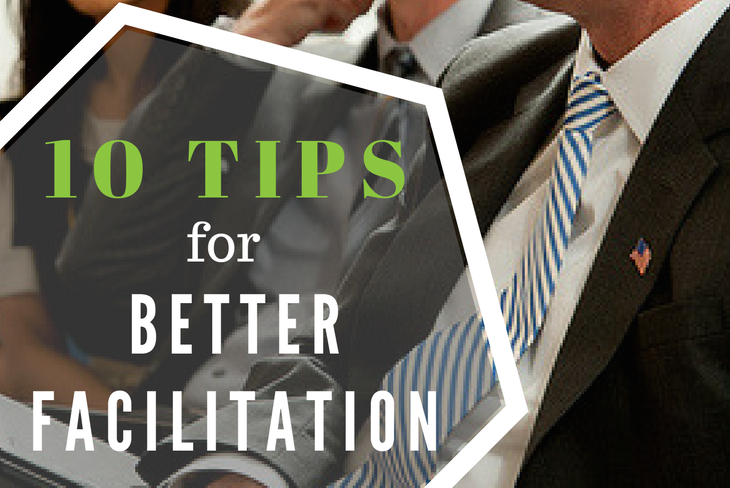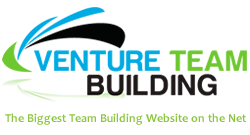
If you’re a trainer or manager who’s been tasked with facilitating a workshop, it is a good idea to learn the basics of facilitation to help both you and your participants get the most from the experience. The aim of the article is to provide you with some guidelines and help you understand the fundamentals of facilitating a workshop.
What is the difference between a trainer and a facilitator? Check out my previous facilitation article.
Here are my top 10 tips for better facilitation:
1) Importance of Beginning
Everything has a beginning, a middle and an end. Getting started is like setting out on a journey or laying the foundation of a house. Remember first impressions last and you need your group to become invested from the start.
Think about how you present the content and help the group identify why the workshop is relevant to them either as an individual or as part of a team in the first ten minutes.
2) Listen, Be Aware and Take Notes
As a facilitator, you should take care to listen to the whole group and each person in it. Listening is one of the primary skills of facilitation and the quality of your listening will profoundly affect the group and the quality of your workshop. Listening should be active, focused and affirming.
Your most important asset as a facilitator is your awareness. You should take note of everything that is said or done and choose to either intervene and offer a suggestion or use the note as a discussion and learning point at the end of the workshop.
3) Use Questions
Questioning is a technique used by facilitators during workshops as an alternative method of presenting new information or to help move the process along.
By asking a question, or series of questions, you guide participants in the right direction and put them in control of their own learning by helping them find solutions for themselves. Even if you know the answer or the solution is obvious, your job as facilitator is to guide the process, not be involved in the content. Instead, lead them to the answer through effective questioning.
4) Intervene only when Necessary
The only reason to use an intervention is to keep the group focused and move the process along. If the group is struggling, then use some questions to guide them in the right direction. Only intervene in group discussion when it is necessary to interrupt negative behaviour that is obstructing progress.
5) Work with Conflict
Disagreement happens as a result of different personalities, different values and different opinions and will sometimes end in heated discussions and debates. If a team is to develop and form, it will need to work with conflict, rather than avoid it and go through the different stages of team development including storming.
You should be comfortable with conflict and encourage opinions to be expressed openly. Creative conflicts can be synergistic and lead to major breakthroughs and progress.
6) Monitor Energy Levels
Monitor the energy level of the group at all times. Energy is indicated by tone of voice, body language, eye contact and the level of participation. The energy of the group will alter all the time. You will see a big difference between a group at the beginning of the day and at the end of the day.
You should aim to keep their level of energy consistent throughout the workshop by varying your delivery style, and type of activities and taking regular breaks.
Short breaks or active challenges can help improve energy and the level of concentration for longer sessions. Plan for a few active team challenges to use when energy is low and to break up your workshop.
Need ideas? Don’t have time to go and find suitable activities?
My eBook, ‘The Team Building Activity Book’ now available will help you have easy access to team-building exercises without any hassle! It includes step-by-step instructions, leader notes and challenger briefs for over 30 of the best team development activities.
7) Improvise
Good facilitation is about staying flexible in your approach, experimenting and having the confidence to react and adjust to circumstances at the moment. Sometimes you may need to deviate from your session plan when there is more and better learning elsewhere.
Respond to the group and improvise when necessary and don’t get hung up on a set structure or doing things a certain way. Remember we learn best through self-discovery and experience.
8) Use Humour
A sense of humour is a great asset to a facilitator. Using humour not only helps build a rapport and make the experience more enjoyable for everyone but it can also be useful when you need to defuse some tense moments during group discussions.
9) Timing is Everything
When you’re new to running workshops, planning how long activities will take is often a guessing game. As mentioned before it is important to stay flexible in your approach and this includes timing. Keep checking the time and adapt when you need to.
If you happen to over-run on one activity it can affect everything else in the programme, so be aware of your timings.
If you’re going too quickly or too slow, take a moment to review and then adapt your plan. If an activity is taking longer than you predicted but is helping you meet your aims and providing useful learning, then it may be a good idea to either scrap another activity or move the programme around.
The most important thing to remember is that you are there to…
10) Get the job done
During the planning stage, make sure you fully understand the purpose and aims of the workshop. This will put you in the best possible position to select activities or methods of teaching that will help you achieve those aims.
It is also a good idea to allocate and spend some time with the group at the beginning of the workshop to understand their expectations and understand their why. Get them started on the first activity as normal, and when you take a break adjust your plan accordingly to ensure that you not only meet the organisation’s needs but also the participants.
There you go ten tips that will hopefully help your facilitation skills and workshop delivery. If you agree, disagree or I’ve missed anything important then feel free to comment below.
Like this post? Pin to save it for your next team-building session!





I think #8 is very important, especially when there has been some conflict in the group. Using a clean joke or just having some fun is a great way to put people at ease and help them relax and share. Good tips here. Thanks for sharing.
Christopher – Great insight.
Thanks for the comment!
Beautiful read. Lots of help to me as an inspiring team builder. I feel a lot more confident now as I set out to actualize my goals.
Happy to hear this was helpful to you & Thanks for leaving a comment for us.
Reading these positive comments almost makes me want to write some more fresh content to help readers. I can’t believe I wrote this over 5 years back now. Happy that this project is still helping others to improve their own facilitation.
You created and wrote a lot of very useful posts and guides that people still benefit from today.